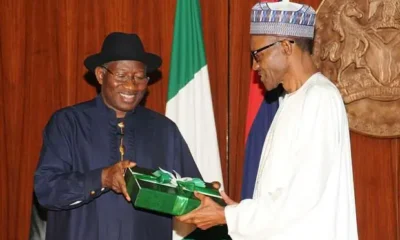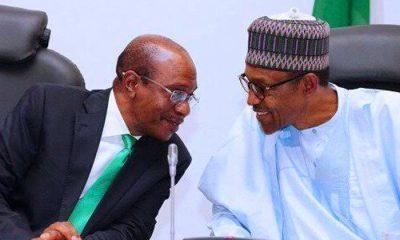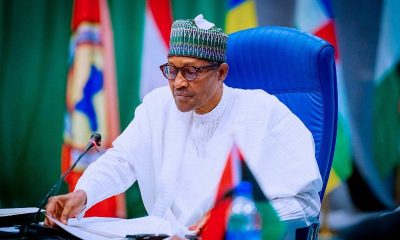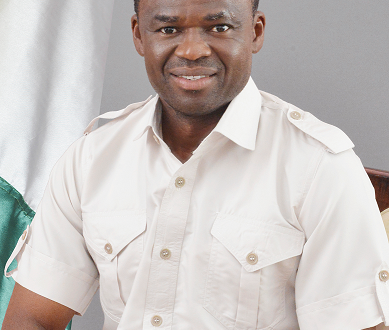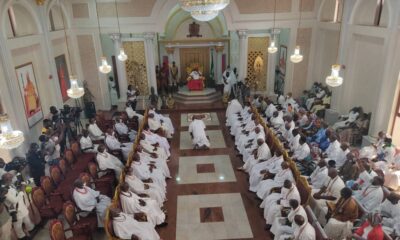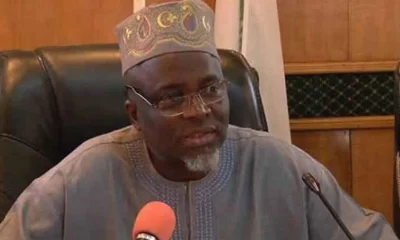News
Palliatives: NEC Rubbishes Buhari’s Social Register, says Its Lacks Credibility
Published
10 months agoon
By
Editor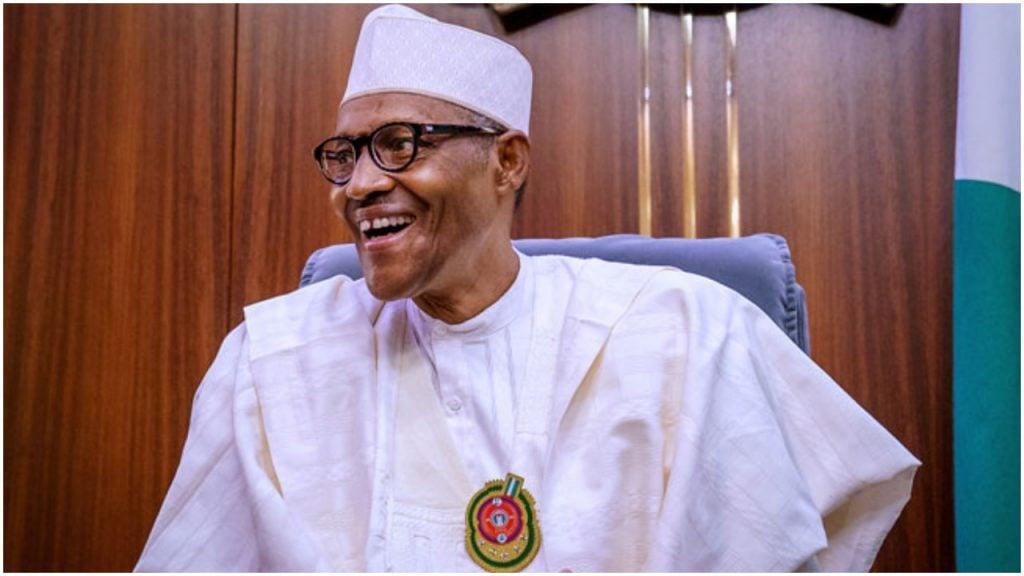
The National Economic Council, NEC, yesterday unanimously resolved to do away with the national social register used by the Buhari’s administration to implement its conditional cash transfer, saying it lacks credibility.
Consequently, it asked states to generate their own registers for such cash transfers.
This is even as the Federal Government announced that it would distribute 252,000 metric tons of grains to states at subsidised rates to cushion the effect of hardship occasioned by petrol subsidy removal.
However, most states yesterday could not give a definite date as to when they would be able to make the register available.
But the NEC meeting, presided over by Vice President Kashim Shettima at the Council Chamber, Presidential Villa, said the register had integrity issues as the criteria for its compilation was unclear.
Briefing State House correspondents at the end of the meeting, Governor Chukwuma Soludo of Anambra State said contrary to what the previous administration projected, it was not possible to digitally transfer money to the poorest of the poor, the majority of whom were unbankable.
He said it was agreed that states should generate registers that were comprehensive and ensure it was only for vulnerable people.
Professor Soludo, flanked by his Bauchi and Ogun states’ colleagues, Bala Mohammed and Dapo Abiodun, respectively, noted that beneficiaries of the supposed transfered cash could not be identified in the villages.
He said NEC resolved that the states should come up with their own registers, using formal and informal means to develop it, assuring that all beneficiaries at the sub-national level could easily be accessed that way.
“We need to face the problem of the fact that we don’t have a credible register,” he said.
Soludo affirmed that NEC deliberated on ways to cushion the impact of the recent petroleum subsidy removal.
Cost of governance issues
While fielding questions from journalists, Soludo said: “The first question that was raised is in relation to cost of governance. I think it’s an omnibus concept, and it’s not something you sit down in a meeting to legislate for each and every state.
“But the fact that the council recognizes that this is an issue that each tier of government should now focus on as an area of concern. That we mustn’t live… even the cost of running the state, the way we even live, so some gave an example of a state governor going with over 20 vehicles in a convoy and all these have to be fueled, and so on and so forth. And the fact that we’re even, among ourselves, almost like in a peer review, kind of setting, talking for ourselves.
“We need to be sensitive to the times, we need to live within the average of the people that we’re governing and so on and so forth, and knock off the waste and the irrelevance so to speak.
“I will like to give you a simple example, When I assumed office, it was costing about N137 million every month to clean up public offices, and so on. Today, in Anambra, we’re doing N11 million a month from N137 million on a monthly basis. Just an illustration.
READ ALSO: N8,000 Palliative: FG Robbing Poor To Pay The Rich – NLC
“It’s a thing we’re persuading each and every one of us to look into, check our books and look ourselves in the mirror and move with the times.
Big question on social register
“Second thing I’d like to respond is in relation to the social register that has been mentioned. I think at the council today, there was almost near unanimity among members that there’s a big question mark about the integrity of the so called National Social Register.
“We have questions about how those names in the register were brought about and I’m sure one question I hear asked is where it is for the most vulnerable group, and so on and so forth.
“Let’s talk about a social register and them distributing things through the social register by digital means, implying that these people already have account numbers and they have phone numbers.
“Maybe we are talking about some other people and not Nigerians. The poorest 25 per cent of Nigerians are likely, if not totally unbanked, and don’t have access to telephone.
“Now in thinking through that, we felt that sitting in Abuja and calling on somebody in Anambra to compile a list and send it to you and then the person depends on who he brings, and the registers are generated and people go to those villages and ask where are those people and they don’t show up. This is stress testing. We think we need to go down back to the drawing board.
“If you are delivering any such national or federal programme from Abuja, it needs to be delivered via the governments that are there using their own format and mechanisms to generate the register that is comprehensive.
“That meets certain criteria, that you can stress test and you can call out the people in the village and everyone will confirm that these are the vulnerable people, if you are targeting vulnerable people, as it were.
“So the integrity test is what is missing with that register. Many have just described what is being counted as national register as bogus, some describe it as a phantom, some in all manner of terms. So we need to face the problem, the fact that we don’t have a credible register and get back to work on this.
New minimum wage
“By the way, there’s something I think my colleagues missed out as part of those recommendations over the medium, longer term, and that is the possibility of negotiating a new minimum wage. That obviously will be on the table. But that has to be negotiated through the appropriate structures for doing that over time.”
Professor Soludo explained that packages to serve as palliatives were marshalled out to encourage the tiers of government to implement them in accordance with their respective fiscal space and fiscal capacities.
He said: “The federal, state and local governments I want to highlight as well, but that is quite some fiscal surplus that will be coming to the states and local government and the federal government and we suggested that it will be nice that you can implement cash transfers, subject to your financial capacity, based on peculiarities.
“Some might be able to do one, some might be able to do 10. Some might be able to do 20 as the case maybe. It depends on their own capacity.
“For example, if you have a state that has been owing salary arrears, workers have been owed for three years, or for four years, the priority would be to even start paying some of the salary arrears or where pensioners have been owed their pension and gratuity for seven years, for example, the priority now might be to use part of the surplus to pay them.
“Then, there are also states that are with bumper harvests and that will say you know what, I want to deploy a chunk of this to implementing cash transfer and several of the other immediate programs and that’s why we couched this point, that this is ultimately still a federation.
‘’The various states and local governments and federal government are at different levels in terms of their fiscal space and fiscal capacity. If the federal government decides to do the same cash transfers for example, we are recommending that they should do so using the framework of the states and local government that are nearer to the people, so to speak. That’s basically that.
‘’We didn’t sit down there to begin to say, oh, okay, this one your transfer will be like what is being bandied around in the media, whether it’s N8,000 or N10,000, or N1,000, or whatever. It will depend on what the state… I guess it’s very important we communicate this clearly.’’
READ ALSO: Tinubu Seeks Reps Approval Of N500bn For Subsidy Palliatives
252,000 tonnes of grains coming
The Bauchi State governor, Senator Bala Mohammed, said the Federal Government would distribute 252,000 metric tons of grains to states at subsidised rate to cushion the effect of subsidy removal.
Mohammed said the National Emergency Management Agency, NEMA, would also make available to the people its package.
On his side, Governor Dapo Abiodun of Ogun State said though the hardship the masses were facing, as a result of the removal of fuel subsidy, was not the doing of the government as market forces determined price, efforts are being made to cushion its effect.
Some of the packages include cash transfer to the poorest of the poor by states, cash award policy for all public servants which should be implemented for six months in first instance, payment to public servants on outstanding liabilities such as pension and allowances, among others.
He also said the government was looking at the possibility of funding Micro Small and Medium Enterprises.MSME, which he said were the engine room of business.
He said further that the government planned immediate implementation of energy transition plants, converting mass transit buses to Compressed Natural Gas, CNG, adding that the long term vision was to establish electric automobile plants.
The governor said: “As a responsible government, we extensively deliberated on immediate steps in appreciation of the fact that our people are already feeling the pains of these very laudable and noble steps and have been very patient with this administration.
“To that extent, a subcommittee of the National Economic Council was set up and that subcommittee reported some of the things the governor of Anambra has shared with us and their report is now the proposal of the National Economic Council and among what the governor of Anambra has shared with us.
“We also proposed accordingly that each state should begin to plan towards implementing a cash transfer program that will be based on the social registers of the states because it is the states that are better positioned to do that enumeration, so you can ensure the integrity of the social register.
“Again, it was also proposed by the Council that we should implement a cash award policy for all public servants. What’s a Cash Award Policy? That would be a policy that allows each sub-national to actually pay the public servants a certain prescribed amount of cash on a monthly basis and was prescribed that that should be implemented for six months in the first instance.
“You’ll be wondering why six months? The idea is that as much as we’re also particular about ameliorating the pains of our people immediately, a lot of sustainable measures are being put in place and it’s our hope that between now and the next six months, those sustainable measures would have begun to be visible and then we can begin to taper down these cash awards.
‘’These cash awards, by the way, would be funds that will be placed in the hands of civil servants that will be tax-exempt.”
On his part, the acting governor of Central Bank of Nigeria, CBN, Folashodun Shonubi said the Federal Inland Revenue Service, FIRS, briefed the council and announced that it was ahead of the half year target.
He said: “It was nice to know that the Federal Inland Revenue Service, FIRS, is ahead of its target for half a year. And we expect that before or by the time the year ends, they would exceed the target.
“They also gave us some idea of what next year should be like from them. And from this year, we hope to make some N10 trillion. It is planning that next year, we should be able, working with all the agencies, provide N25 trillion as their contribution to the national coffers.”
Meanwhile, states could not give definite dates yesterday on when their register would be ready for the cash transfer.
Aside from Kebbi, which said it could get its register ready in two weeks, others could not state when theirs would be ready.
‘’The governor has settle for at least two weeks to generate the palliatives register as he has ordered immediate commencement of compilation of a through register which would cover every body,’’ said Ahmed Idris, Chief Press Secretary to Governor Nasir Idris of Kebbi State.
On his part, the Special Adviser to Ekiti State Governor on Media, Yinka Oyebode, said the government would set machinery in motion to look into the matter as soon as possible .
“This step is necessary in order to ensure that only those identified and verified as indigent are registered for the financial assistance,’’ Oyebode said.
It’ll be done when Akeredolu resumes—Ondo govt
In its reaction, the Ondo State government promised to do the needful as soon as possible on the cash transfer register.
A top government official, who spoke on the condition of anonymity, said: “Such decisions would have to be tabled when the governor resumes from his medical leave.
“Since it’s the decision at the NEC meeting, it would be carried out to the letters, trust our governor, Rotimi Akeredolu. The state cash transfer register would soon be set up, that I can assure you.”
Rivers
Similarly, an official of River State government who pleaded anonymity said: “Just got that information but the deputy governor represented my principal and until she returns for proper briefing and action plans, we can’t give a definite date, so wait briefly”.
READ ALSO: Subsidy Removal: Roll Out Palliative Measures, ActionAid Tells Tinubu
Osun gov to meet stakeholders—Spokesperson
Contacted, spokesperson to the governor of Osun State, Olawale Rasheed, said his principal just left the meeting and would need to meet stakeholders in the state on best way to put a new register together.
Efforts on for a comprehensive data register—LASG
In its reaction, the Lagos State government said efforts were on to evolve a comprehensive data register that would capture reasonable number of residents in due course.
Chief Press Secretary to the state governor, Gboyega Akosile, said the governor would make a categorical statement on the issue soon.
He said: “We are taking a holistic look at the development and Lagos State, being a centre of excellence will soon come out with a stance on this.
“Lagos State already has a similar register called social register, though it is not comprehensive because series of dynamics have taken place. I just want to assure you that very soon, Lagos will come with a definite register. There is a template for it already.”
Stakeholders’ll be consulted before a register will be generated – Ebonyi govt
On its part, Ebonyi State government said it would consult relevant stakeholders across the state to come up with a register of individuals that would benefit from the federal government’s palliatives.
The Commissioner for Information and State Orientation, Engr. Jude Chikadibia Okpor, who disclosed this in Abakaliki, said: “After all relevant stakeholders must have been consulted, a list will be generated for the benefit of all and sundry.
“There’s no way a list will be generated immediately. Remember, nobody was aware that such decisions will be taken.
‘’Ebonyi people should rest assured that Governor Francis Ogbonna Nwifuru will ensure that democracy dividends get to the grassroots level and to every citizen.”
VANGUARD
You may like


Appeal Court Declines To Order CCB To Reveal Assets Of Jonathan, Buhari, Others


6.2m Theft: FG Declares CBN Staff, Others Wanted For Forging Buhari’s Signature


Fuel Subsidy Removal Cripples 90% Of Nigerian Businesses – Report


Court Declares Buhari’s Appointment Of FCC Chair, Secretary Illegal


Nigerians ‘Most’ Difficult People To Govern – Buhari


Fuel Subsidy: Afe Babalola Varsity Increases Staff Gross Salaries By 35%

The Federal Government, through the Ministry of Solid Minerals Development, has announced plans to review rates of mining licenses and other sundry fees payable by mining operators in the country.
Speaking during a consultative meeting with stakeholders in the mining industry on Thursday in Abuja, the Minister of Solid Minerals Development, Dele Alake, stressed that the review has become inevitable if government is to effectively fulfil its obligations of providing an enabling environment for mining operations whilst also raising more revenue for government.
He added that the plan would also boost the capacity of government to effectively reposition the mining sector and solicited the support of stakeholders for the impending increase in fees for mining licenses and other sundry fees.
READ ALSO: EFCC Chairman Narrates How 17-year-old Hacked His Computer, Bank Account
Highlighting efforts to reposition the mining industry, the Minister revealed that asides from on-going reforms, the administration is sanitising the mining environment through the newly unveiled mining marshals, which he affirmed has been conducting operations in parts of the country to protect legitimate miners and combat illegal mining.
The minister in a statement signed by his special assistant on media, Segun Tomori said, “For us to continue to ensure that we secure the mining environment and keep putting in place measures that will ease the operational difficulties and challenges that confront miners, we need to review the rates of mining licenses and other sundry fees.
“We felt that we can’t just do this without letting you know because invariably, you are the players in the industry.”
Concerning the recent revocation of dormant mining licenses, the Minister noted that the government followed due process and extant laws guiding the action, emphasising that a 30-day restitution window still exists for operators that were affected.
It will be recalled that the Minister announced a restitution fee of N10m, 7.5m, 5m and 2.5m for Mining Leases, Small Scale Mining Licenses, Exploration License and Quarrying License respectively for revoked dormant licenses including those earlier revoked for default in payment of annual service fees.
In his submission, the Director-General of the Mining Cadastral Office, Engr. Obadiah Nkom, who also chair the fees review committee, stated that the committee recommended new rates that are affordable and will enhance the competitiveness of the fiscal regime of the mining sector in comparison with regional and global standards.
READ ALSO: JUST IN: Police Arrest Mastermind Of Abuja-Kaduna Train Attack
Speaking on behalf of the stakeholders, the President of the Miners Association of Nigeria, Dele Ayanleke commended the Minister for his efforts to put the mining sector on global frontburner, expressing support for ongoing reforms and plans to review fees payable by operators.
He urged the minister to consider challenges faced by miners and ensure the rates are affordable.
Other stakeholders in attendance include Representatives of Women In Mining, Gemstone Miners Association and top officials of the ministry.
News
EFCC Chairman Narrates How 17-year-old Hacked His Computer, Bank Account
Published
9 hours agoon
May 2, 2024By
Editor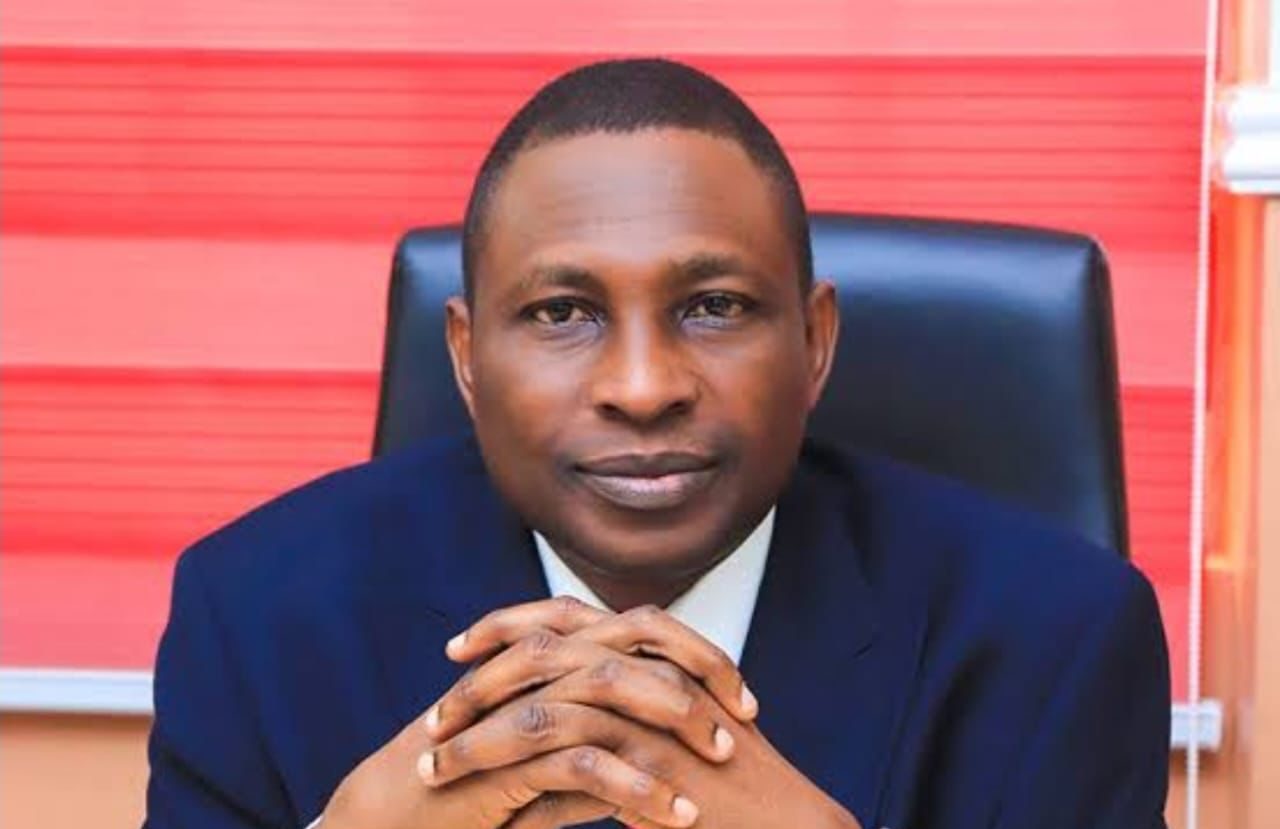
The Chairman of the Economic and Financial Crimes Commission, Ola Olukoyede, narrated an incident where a 17-year-old successfully hacked into his personal computer and bank account while being interrogated at his office in Lagos.
The anti-graft agency chairman made this known in a chat with editors at the EFCC Headquarters, Jabi, Abuja, last Tuesday.
Olukoyede recounted inviting the 17-year-old for questioning at his own office, only to witness the young hacker effortlessly bypass the security measures of his locked computer right before his eyes.
He said, “I brought into my Lagos office a seventeen-year-old boy who is studying History and Anthropology. He is in the 200 level. He is not doing anything science-related. The guy sat in my office in Lagos and demonstrated some things to me on my laptop.
“He asked for my number, I gave him my number and through my number, he got my BVN. He then mentioned the name of my account number to me at the bank. I didn’t tell him anything.”
READ ALSO: How Two Kenyan School Dropouts Made Prosthetic Arms For People With Disabilities
According to him, the country must take all necessary measures to discourage these young individuals, as their actions could lead to imprisonment or even fatal consequences.
“The problem is, I see crime in that, and I also see opportunities in it. So, if you leave these guys, we don’t make them know that what they are doing is wrong, if you leave them, they will continue to see it as a way of life to make money.”
He mentioned that due to their young ages, the EFCC would administer light sentences to punish youths for the cybercrimes they committed, while also focusing on helping them change their orientation.
“We plead for light sentences so that we can reorientate them and that’s part of what we’re doing. What joy will I derive from sending a 17-year-old boy to jail? You have destroyed his future. You have destroyed his career.
“Sometimes they give them options of fines and all of that conviction, so we bring them in, lecture them and talk to them.”
In a bold demonstration of his skills, the boy confidently informed Olukoyede that he could transfer up to 10 million naira from any account in a single transaction.
READ ALSO: Woman Kills One Year-old Son In Delta
He said the 17-year-old boy, when he was done, said, “Look, oga, I can make 10 million now. I will demonstrate it to you. I will move money from your account to mine.
“I said no, don’t do that in my office and he was ready to do that. When he opened my laptop, I didn’t give him the key to my laptop and he had access.
“When questioned about his involvement in cybercrime, the boy explained that his parents, who are both farmers, were unable to work on their farm due to security concerns.
“He has two younger ones. One is in JSS2 and the other is in SSS2. He is the one feeding his parents and responsible for the payment of tuition for his younger ones.
“I saw a Bill Gates in that guy.”
Olukoyede, however, assured the boy that he would take responsibility for his schooling if he was able to stop the criminal act.
“I told my family, we are going to do that.
READ ALSO: Naira Abuse: EFCC, Cubana Chief Priest To Settle Out Of Court
“I spoke to one of my friends who is also ready to help take up the schooling of the SSS 2 guy. So I’m still looking for someone who will take up the one for the JSS 2 sibling.”
This is not the first time the EFCC chairman has revealed the anti-graft agency’s plan to rehabilitate convicted internet fraudsters with reduced sentences.
Addressing a delegation of the National Association of University Students in March 2024, he said “when you think deeply, that tag ‘ex-convict’ is not a good thing. You can never tell where you will find yourself tomorrow, and they will want to profile you and discover that you are an ex-convict.”
“So, it is even in the interest of the youth that the EFCC is doing what it is doing to prevent them from indulging in the heinous act of cybercrime.”
News
Uganda President, Museveni Blasts Western Countries, Says ‘You Fund Seminars But Won’t Aid Manufacturing In Africa
Published
9 hours agoon
May 2, 2024By
Editor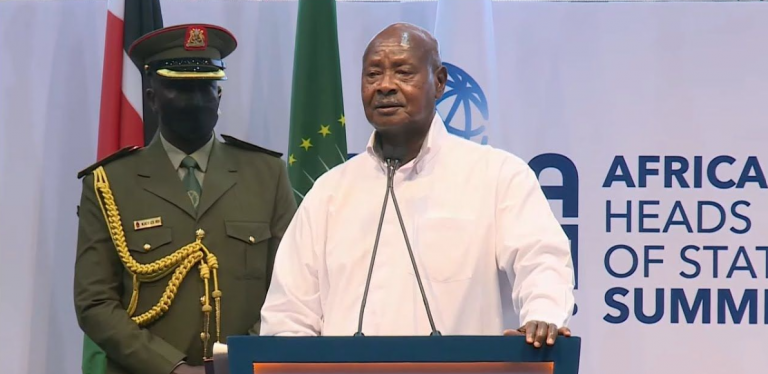
President Yoweri Museveni of Uganda took a bold swipe at world leaders during his speech at the World Bank’s International Development Association summit for African Heads of state, held in Nairobi, Kenya, on Tuesday.
In his remarks, Museveni opined that most of Africa’s problems predicted over 60 years ago were a result of philosophical, ideological, and strategic economic mistakes.
He alleged that a fundamental African problem is that aid from the World Bank and other Western bodies was majorly for profiteering.
“The crisis which is in Africa today is because of philosophical, ideological, and strategic economic mistakes which we have been talking about since the 1960s. It is not an accident when you see the crisis in many African countries, the collapse of States. We predicted this in the 1960s – philosophical, ideological, and strategic mistakes. I don’t have time to amplify each one but I was very happy to hear the president of the World Bank talking about prosperity instead of profiteering.
“Aid has been for profiteering, this has been the problem. Now, the World Bank people and other groups have been talking about sustainable development. Even in your documents, I have seen those words there, sustainable development”, Museveni stated.
READ ALSO: VIDEO: Lagos Uncovers Another Under-bridge Apartment
He argued that what Africa needed to thrive as a continent was not sustainable development as always suggested by the World Bank, and other key players in economic development, but social and economic transformation.
He urged the World Bank and world leaders to quit pushing sustainable development as a key factor in achieving a more developed African continent.
“I would ask you to change those words in your documents. Africa does not need what you could call sustainable development. Africa needs social and economic transformation. The main reason why there’s no growth is because the growth factors are not funded, they are not even understood. What are the growth factors, we now talk of private sector growth. Yes, but for the private sector to grow what does it need? It needs a low cost of production”, he said.
In his opinion, the main reason Africa remains underdeveloped is because the growth factors are not funded and they are not understood by the Western world.
He added that for Africa to be more developed and independent, the private sector needs funding. According to him, adequate funding for the transportation, power and agricultural sectors will boost low production costs.
“Ministers of finance, what are the low costs of production? Number one is transport. You must have low transport costs. Where do low transport costs come from? The railway? If you don’t fund the railway how will you get low transport costs?
READ ALSO: How Two Kenyan School Dropouts Made Prosthetic Arms For People With Disabilities
“Wonderful people, IMF, where will low-cost operations come from if you don’t have a railway? If you don’t fund the railway, how would you get low transport costs? I have been here for the last 64 years, I have been watching as a student leader, as a freedom fighter and now as the leader of a country. How many railways have been constructed or funded in Africa? The few that have been was by China, the Tanzanian railway to Zambia, and recently, another one here in Kenya. Tanzania on their own is building a railway line. So if you’re talking of developing Africa, fund the railway. If you fund the railway, you will have a low cost of transport and you can produce cheap products which can be bought all over the world.
“The second cost pusher is electricity. If you don’t fund electricity and you talk about sustainable development, what are you then talking about? We must have low-cost electricity not exceeding 5 cents per kilowatts, per hour. That is what I insist on in Uganda. I am tired of all these stories, I have put my foot down saying I don’t want to hear those stories. Uganda is a developing country and it will continue to develop because I don’t entertain nonsense anymore.”
Speaking further, Museveni who has ruled Uganda for over 40 years accused the World Bank and Western leaders of refusing to lend him money for capital projects such as the establishment of the Uganda Development Bank.
He lamented the rate at which loans are promptly approved and grated for frivolities but not for serious projects that would yield economic gains.
READ ALSO: Naira Abuse: EFCC, Cubana Chief Priest To Settle Out Of Court
He said, “Borrowing, for what? Capacity building! Imagine! They call you to a hotel where you eat Chapati and mandazi, and they say that is capacity building. Capacity building should be on the ground and not just in seminars. So, the second point your Excellencies is electricity. The third one; is for those people who talk about private sector growth, I have been trying to borrow money for our Uganda Development Bank, a bank which funds manufacturers, but no, I don’t get support for that.
“They say they want my people to go to commercial banks. Those commercial banks are to encourage import because the only person who can borrow money from a commercial bank and pay it back is a trader who goes to China, Dubai buys goods, sells them quickly and pays the loan back. So, if you are serious, I need it here, about the low-cost funding for manufacturing, not stories.”
“How about funding for irrigation? Because if you want to stabilise agriculture, a country like Uganda is very rich, we have got everything. But sometimes, we have some erraticness because of the rains. So, to stabilise irrigation I’ve been trying to look for a loan for irrigation but I can’t easily get it, it is very difficult to get. But a loan for seminars is very quick.”
PUNCH

PICTORIAL: C&S Church Ayo Ni O Installs New Leader

Court Remands Tenant For Setting Landlord’s House On Fire In Ibadan

Officer Who Shot Man Dead During Fuel Queue Tumult Identified — Lagos Police
Trending

 Politics2 days ago
Politics2 days agoWhy Candidate Who Needs Interpreter Can’t Be Edo Gov – Shaibu

 Metro4 days ago
Metro4 days agoEdo Police Arrest Suspected Cultists Who Allegedly Killed Rival In His Daughter’s Presence

 Business3 days ago
Business3 days agoCustomers Panic As CBN Bans Opay, Palmpay, Others’ New Accounts

 News4 days ago
News4 days agoJUST IN: Popular Gospel Singer Is Dead

 News1 day ago
News1 day agoEx-policeman Who filmed Wife Having Wex With Her Superior Found Guilty Of Stalking

 News3 days ago
News3 days agoOoni: Suspended Benin Palace Functionaries Banished

 News3 days ago
News3 days ago2024 UTME: JAMB Withholds Results Of 64,624 Candidates

 News3 days ago
News3 days agoBREAKING: JAMB Releases 2024 UTME Results

 News2 days ago
News2 days agoJUST IN: FG Approves Salary Increase For Civil Servants

 Metro4 days ago
Metro4 days agoGunmen Assassinate Governor Aiyedatiwa’s Campaign Coordinator In Ondo
